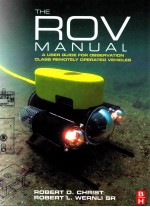图书介绍
The ROV manual : a user guide to observation-class remotely operated vehiclesPDF|Epub|txt|kindle电子书版本下载

- 著
- 出版社: Butterworth-Heinemann;elsevier
- ISBN:0750681489
- 出版时间:2007
- 标注页数:308页
- 文件大小:50MB
- 文件页数:326页
- 主题词:
PDF下载
下载说明
The ROV manual : a user guide to observation-class remotely operated vehiclesPDF格式电子书版下载
下载的文件为RAR压缩包。需要使用解压软件进行解压得到PDF格式图书。建议使用BT下载工具Free Download Manager进行下载,简称FDM(免费,没有广告,支持多平台)。本站资源全部打包为BT种子。所以需要使用专业的BT下载软件进行下载。如BitComet qBittorrent uTorrent等BT下载工具。迅雷目前由于本站不是热门资源。不推荐使用!后期资源热门了。安装了迅雷也可以迅雷进行下载!
(文件页数 要大于 标注页数,上中下等多册电子书除外)
注意:本站所有压缩包均有解压码: 点击下载压缩包解压工具
图书目录
1 A bit of history1
1.1 Introduction1
1.2 What is an ROV?1
1.3 In the beginning2
1.4 Today’s observation-class vehicles8
2 ROV design11
2.1 Underwater vehicles to ROVs11
2.2 Autonomy plus:‘why the tether?’13
2.3 The ROV18
3 ROV components46
3.1 Mechanical and electro/mechanical systems47
3.2 Primary subsystems58
3.3 Electrical considerations64
3.4 Control systems71
4 Underwater acoustics and positioning81
4.1 Underwater acoustics81
4.2 Acoustic positioning96
5 Sonar125
5.1 Sonar basics125
5.2 Sonar types and interpretation142
5.3 Sonar techniques155
6 Oceanography162
6.1 Distribution of water on Earth162
6.2 Properties of water162
6.3 Coastal zone classifications and bottom types190
6.4 Effects of wave pattern upon ROV operation191
7 Environment and navigation193
7.1 The 3D environment193
7.2 The necessity of achieving objectives through navigation197
7.3 Currents and tether management202
8 Homeland security207
8.1 Concept of operations207
8.2 Tactics,techniques,and procedures(TTPs)207
8.3 Operating characteristics of ROV size categories208
8.4 Port security needs208
8.5 Underwater environment of ports209
8.6 Navigation accessories210
8.7 Techniques for accomplishing port security tasks212
8.8 Development of TTPs for port security214
8.9 Results of procedures testing by sizes214
9 Explosive ordnance disposal and mine countermeasures219
9.1 Background219
9.2 EOD applications222
9.3 MCM today222
10 Public safety diving229
10.1 Public safety diving defined229
10.2 Mission objectives and finding items underwater with the ROV229
10.3 When to use the diver/when to use the ROV230
10.4 Search theory and electronic search techniques231
11 Commercial,scientific,and archeological242
11.1 Video documentation242
11.2 High current operations244
11.3 Operations on or near the bottom245
11.4 Enclosed structure penetrations246
11.5 Aquaculture254
11.6 Documentation and disposition255
12 Standard operating procedures256
12.1 Overall operational objectives256
12.2 Equipment mobilization257
12.3 Operational considerations257
12.4 Pre-dive operations and checks260
12.5 Specific considerations for operational deployment of ROVs263
12.6 Task list and guidelines267
12.7 Post-dive procedures278
13 Servicing and troubleshooting279
13.1 Maintenance279
13.2 Basics of ROV troubleshooting280
13.3 Tools and spares for field work282
13.4 Standard preventative maintenance checklist283
13.5 Operational forms283
14 Putting it all together289
14.1 Attention to detail289
14.2 Training and personnel qualifications289
14.3 Equipment setup considerations290
14.4 Division of responsibility290
14.5 Boat handling291
14.6 Marking the target(s)291
14.7 Methods for navigating to the target293
14.8 Sonar/ROV interaction294
Appendix A Test questions and answers296
Bibliography303
Index305